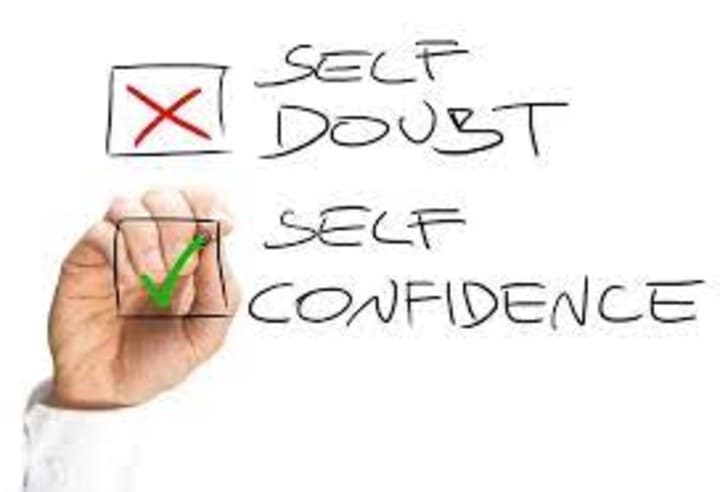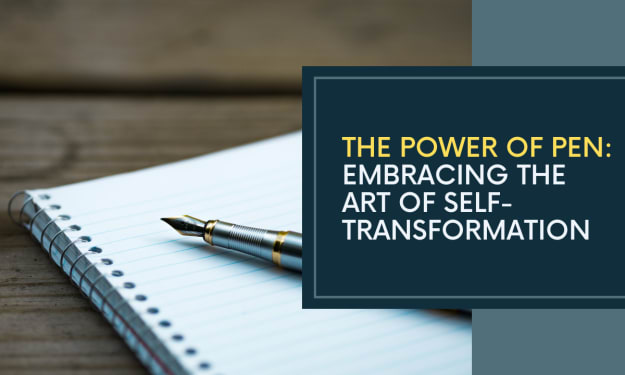OVERCOMING SELF-DOUBT
How To Build Confidence And Believe In Yourself

Introduction
Self-doubt is something that most people experience at some point in their lives. It is that inner voice that tells you that you are not good enough, smart enough, or talented enough to accomplish your goals. When self-doubt takes over, it can lead to a lack of confidence and a fear of failure, which can hold you back from reaching your full potential. However, with the right mindset and strategies, you can overcome self-doubt and build confidence in yourself. In this article, we will explore some effective ways to build confidence and believe in yourself.
1. Identify and challenge your limiting beliefs:
One of the main causes of self-doubt is limiting beliefs. These are beliefs that you have about yourself, your abilities, or the world around you, that limit your potential. For example, if you believe that you are not good enough, you may not even try to pursue your dreams because you think you will fail. To overcome self-doubt, you need to identify your limiting beliefs and challenge them.
Start by writing down your limiting beliefs. Once you have identified them, ask yourself if they are true. Often, limiting beliefs are based on assumptions or past experiences that are no longer relevant. For example, if you failed a test in high school, you may believe that you are not smart enough to succeed in college. However, this belief is not true because you have not tried to succeed in college yet.
Once you have identified your limiting beliefs, challenge them by asking yourself if they are helping or hindering you. If a belief is hindering you, replace it with a more empowering belief. For example, instead of thinking, "I am not smart enough to succeed," think, "I am capable of learning and improving." By challenging your limiting beliefs, you can change the way you think about yourself and your abilities.
2. Celebrate your successes:
When you are experiencing self-doubt, it can be easy to focus on your failures and shortcomings. However, this negative thinking can make it harder to build confidence in yourself. Instead, focus on your successes and celebrate them.
Start by making a list of your accomplishments, no matter how small they may seem. This could include anything from getting a good grade on a test to completing a project at work. When you have a list of your accomplishments, take time to reflect on them and acknowledge your hard work and achievements.
When you celebrate your successes, you build confidence in yourself and your abilities. You also create a positive mindset that can help you overcome self-doubt.

3. Surround yourself with positive people:
The people you surround yourself with can have a significant impact on your self-confidence. Negative people can bring you down and make it harder to believe in yourself. On the other hand, positive people can lift you up and help you see your potential.
To build confidence in yourself, surround yourself with positive people who believe in you and your abilities. These people can be friends, family members, or mentors who support and encourage you. When you are around positive people, you will feel more confident and motivated to pursue your goals.
4. Practice self-care:
Self-care is an essential part of building confidence and believing in yourself. When you take care of your physical, emotional, and mental well-being, you feel better about yourself and your abilities. This can help you overcome self-doubt and build confidence.
Start by taking care of your physical health. This could include exercising regularly, eating a healthy diet, and getting enough sleep. When you feel good physically, you are more likely to feel good mentally and emotionally.
You can also practice self-care by doing things you enjoy. This could be anything from reading a book to taking a relaxing bath. When you take time for yourself, you show yourself that you are worth the effort and attention. It can also help you feel more relaxed and less stressed, which can improve your overall mood and mindset.
Another aspect of self-care is setting boundaries. This means learning to say no to things that don't align with your values or priorities, and creating space for the things that matter to you. When you set boundaries, you are prioritizing your own well-being and taking control of your life, which can boost your confidence.
5. Take action:
One of the best ways to overcome self-doubt is to take action towards your goals. When you take action, you prove to yourself that you are capable of achieving what you set out to do. This can build confidence and help you believe in yourself.
Start by setting small goals that are achievable. When you accomplish these goals, you will feel a sense of accomplishment and confidence that can carry over into bigger goals. As you take action towards your goals, focus on progress rather than perfection. Remember that mistakes and setbacks are a natural part of the process, and they do not define your worth or abilities.
6. Practice self-compassion:
Self-compassion is the practice of treating yourself with kindness, understanding, and acceptance, even when you make mistakes or experience setbacks. It is an essential part of building confidence and overcoming self-doubt.
Start by being mindful of your inner dialogue. When you notice negative self-talk, try to reframe it with self-compassionate statements. For example, instead of saying, "I'm such a failure," you could say, "It's okay to make mistakes. I can learn from this and do better next time."
You can also practice self-compassion by treating yourself like you would treat a friend. Be gentle and understanding with yourself, and acknowledge that everyone makes mistakes and faces challenges. By practicing self-compassion, you can build a stronger sense of self-worth and belief in yourself.

7. Learn new skills:
Learning new skills can be a great way to build confidence and overcome self-doubt. When you learn something new, you prove to yourself that you are capable of growth and improvement. This can boost your self-esteem and help you believe in yourself.
Start by identifying a skill that you would like to learn or improve. This could be anything from learning a new language to improving your public speaking skills. Once you have identified a skill, take steps to learn it. This could include taking a class, reading a book, or practicing on your own.
As you learn and improve, celebrate your progress and accomplishments. This can help you build confidence in yourself and your abilities.
Conclusion
Self-doubt is a common experience, but it doesn't have to hold you back from reaching your full potential. By challenging your limiting beliefs, celebrating your successes, surrounding yourself with positive people, practicing self-care and self-compassion, taking action, and learning new skills, you can build confidence and believe in yourself. Remember that building confidence is a process, and it takes time and effort. Be patient and kind to yourself, and don't be afraid to seek support from others. With the right mindset and strategies, you can overcome self-doubt and achieve your goals.
About the Creator
Sukriti gupta
If you are looking for insightful and informative content on a wide range of topics, then you have come to the right place. I'm excited to share my insights on topics such as personal growth, nature, history, stories and much more.






Comments
There are no comments for this story
Be the first to respond and start the conversation.